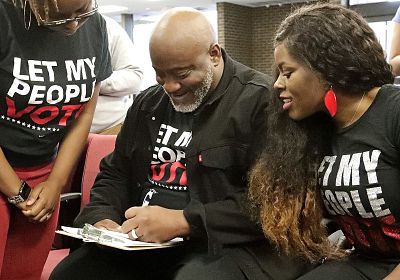A legal battle over whether the state can block people with outstanding fines and fees from voting has yet to be fully resolved.
Desmond Meade can't vote in Orlando's mayoral contest. But he'll be in the city on Saturday anyway, cheering as hundreds of recently reinfranchised ex-felons and their families head to the polls together.
 ADVERTISEMENT
ADVERTISEMENT
 ADVERTISEMENT
ADVERTISEMENT
Meade, the organizer who lead a campaign to amend Florida's Constitution and restore voting rights to an estimated 1.4 million people with felony convictions, called the party "a celebration of expanding our democracy." He has three felony convictions of his own, acquired during years of drug addiction. Just the thought of voting again, he said, "brings tears to my eyes."
But after the festivities, he has to return to work.
Since it was overwhelming passed by voters last year, the constitutional amendment Meade and his group, the Florida Rights Restoration Coalition, fought for has spurred legislation and litigation over differences of opinion in how to interpret and implement it. The FRRC has renewed its educational efforts, kicking off a a 23-city bus tour Saturday to register eligible ex-felons and raise awareness about a fund to help people pay off fines and fees associated with their convictions — an issue at the heart of the latest legal battle voting rights advocates have waged over restrictions lawmakers put in place that could still keep thousands from accessing the ballot box.
The amendment said rights restoration would automatically apply to convicted felons who completed "all terms of their sentence including parole or probation," but would not apply to people convicted of murder or felony sex crimes. Previously in Florida, felons were disenfranchised for life unless they pursued a years-long clemency process, which restored rights to an average of 400 people a year.
In June, Florida's GOP-controlled legislature voted along party lines to pass S.B. 7066, a bill implementing the amendment with arequirement that former felons pay off all court fees and fines before the terms of their sentence is deemed completed.
An estimated 80 percent of Florida felons are assigned fees, fines or restitution at sentencing, according to a recent court filing, and many will spend years or decades on payment plans to settle — meaning thousands of people were suddenly no longer eligible for rights restoration. Meade estimates that more than half a million people cannot register to vote because of these financial obligations.
Advocates slammed the provision as a "poll tax." The American Civil Liberties Union, Brennan Center for Justice and NAACP Legal Defense Fund quickly sued to block the law, which they argued defied the will of Florida voters.
In October, U.S. District Judge Robert Hinkle gave voting rights advocates a big win: a preliminary injunction ruling that Florida could not preclude people with prior felony convictions from voting based on unpaid financial dues if they truly couldn't afford it. Voting rights advocates hailed the injunction as a "massive victory," because it rejected the idea that the fines could keep plaintiffs from the ballot box, but acknowledged that it was limited, in part because it only granted relief to the 17 named plaintiffs.
Meanwhile, at the request of Republican Gov. Rick DeSantis, the Florida State Supreme Court is expected to wade into the fight, too, with an opinion on whether the constitutional amendment includes financial obligations, as lawmakers insist. Hinkle wrote in his ruling that he anticipates the court will interpret the amendment in line with Florida's legislators.
Lawyers in the federal court case warn that if the legislature fails to make proper accommodations for felons with outstanding fines, they will opt to go to trial, which is currently slated for April.
"The state can't continue to disenfranchise people under an unconstitutional system," said Julie Ebenstein, a senior staff lawyer for the ACLU's Voting Rights Project. "We'll continue to fight for full relief in Florida to make sure that inability to pay is not a barrier to voting for anyone."
And there are still outstanding practical issues with the law. Because Florida has no centralized system to track the fees and fines, it's sometimes difficult for former felons to figure out how much they owe the state.
State Sen. Jeff Brandes — one of the architects of S.B. 7066 — said that per Hinkle's recommendation, lawmakers will decide on how to address the issue of outstanding court fines within the voter registration process when the legislature reconvenes in January.
"We're hoping that the state will resolve these dire constitutional concerns because to fail to do so would both go against the will of Floridians when they passed Amendment 4, and we would all find ourselves back in court to resolve those issues," Ebenstein said.
But Meade remains positive.
"In spite of the litigation and legislation, we know what we're talking about is real people," he told NBC News this week. "We've been laser-focused on the fact that there are a significant number of people who are eligible to register to vote, who don't face financial obligations."
Meade said his group is helping people petition the courts to reduce their fees and fines while also raising cash to pay off what others owe.
"Folks need to know that — it's not all gloom and doom," Meade said. "There are alternative pathways."











